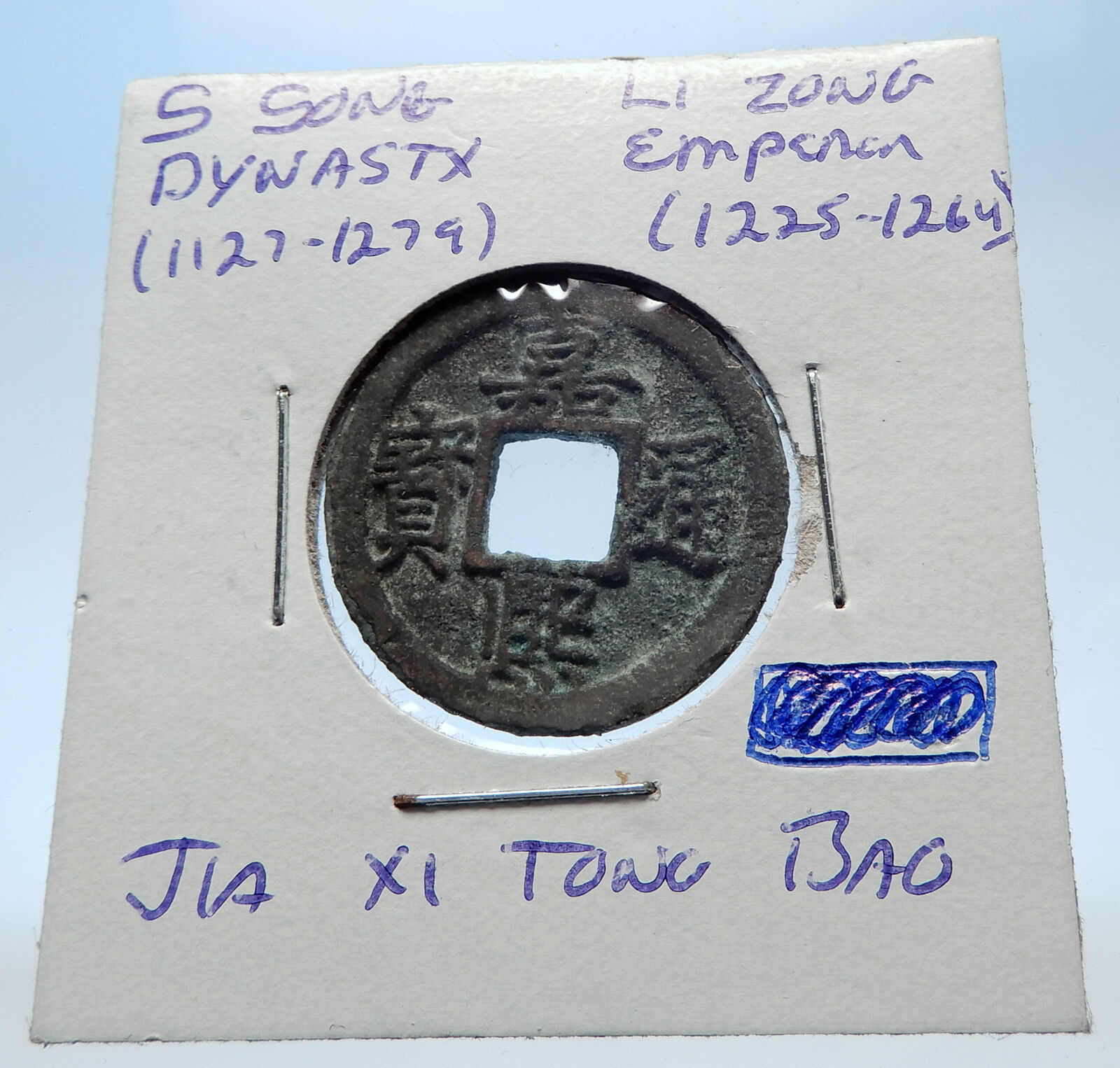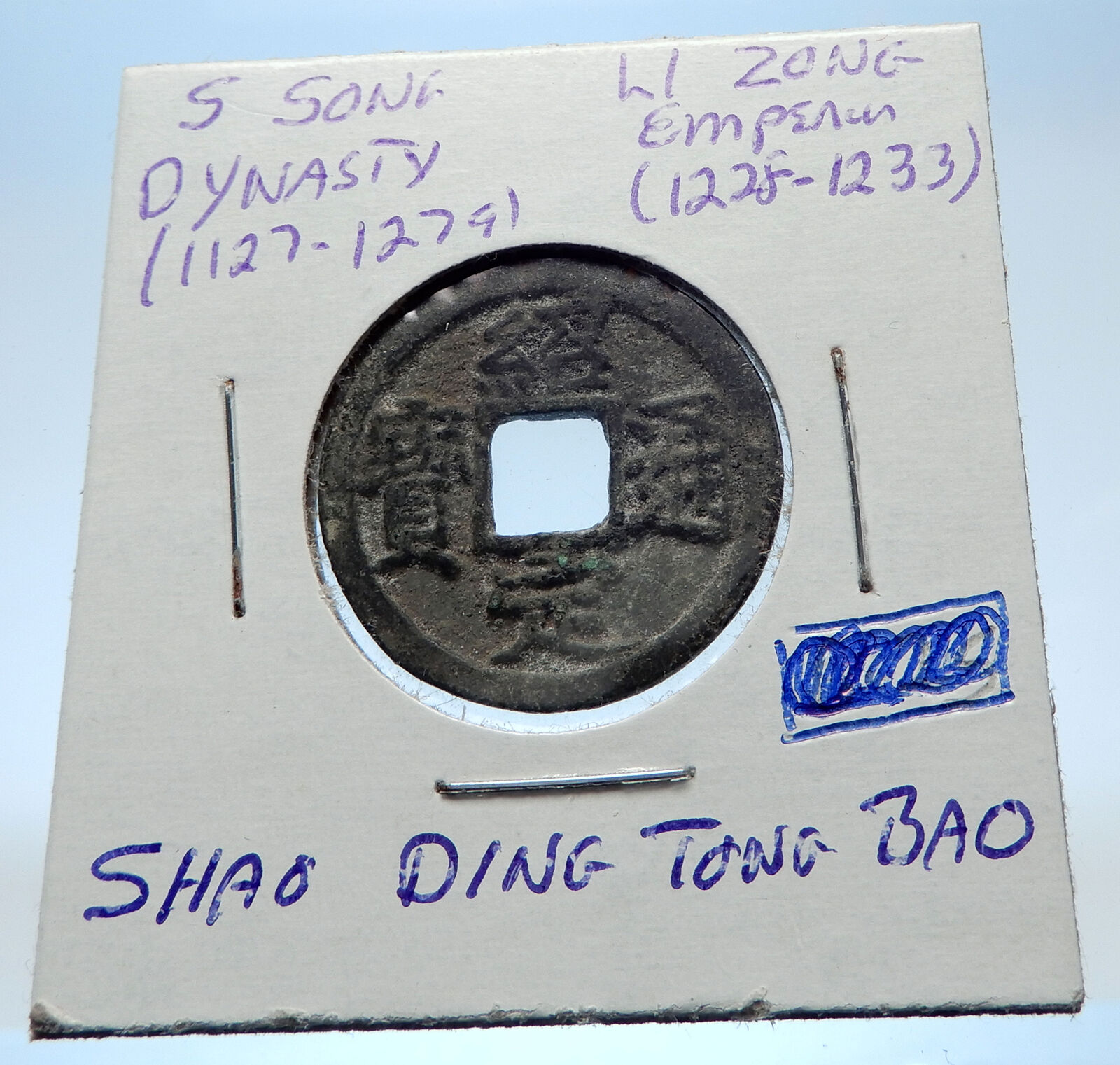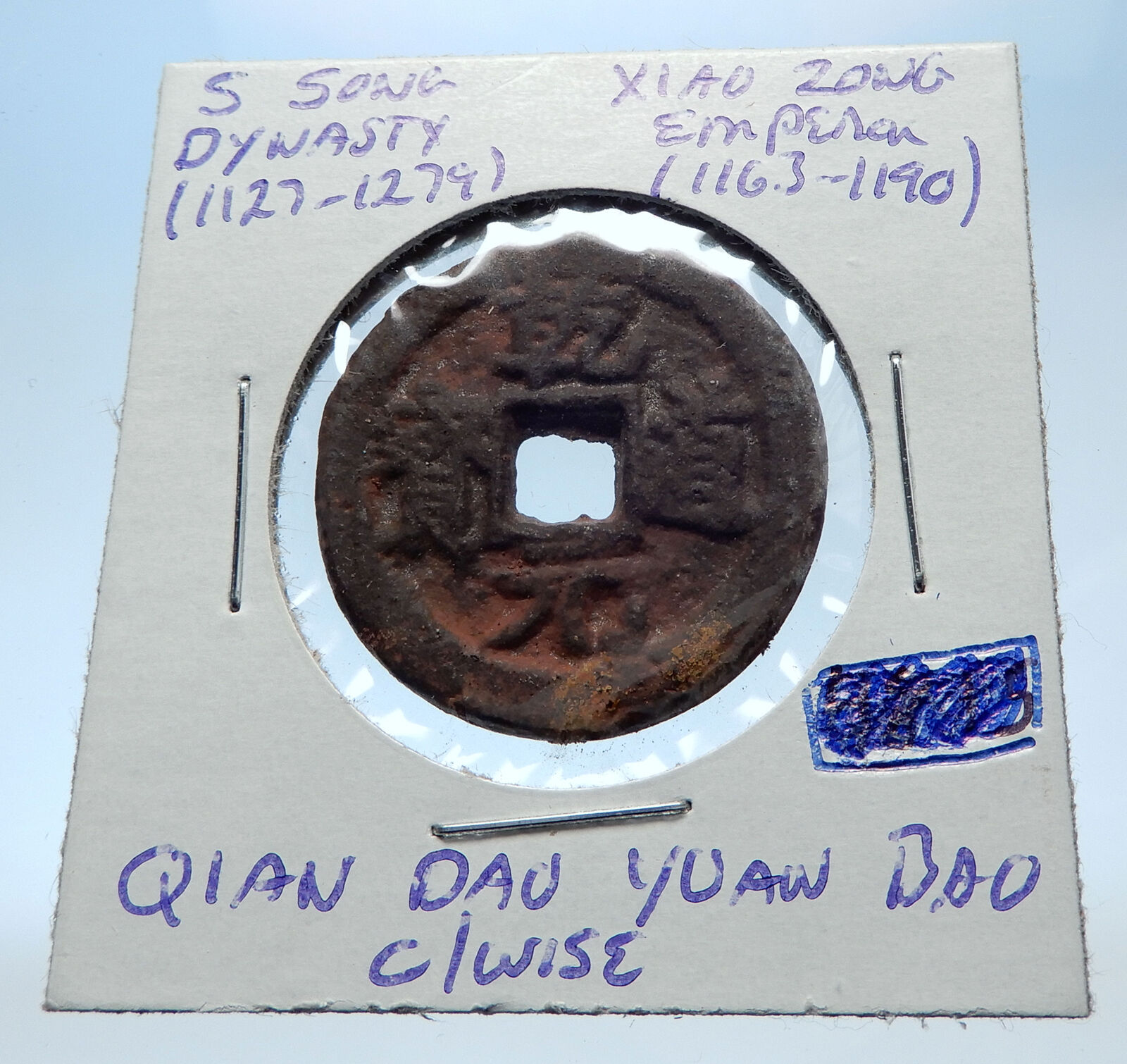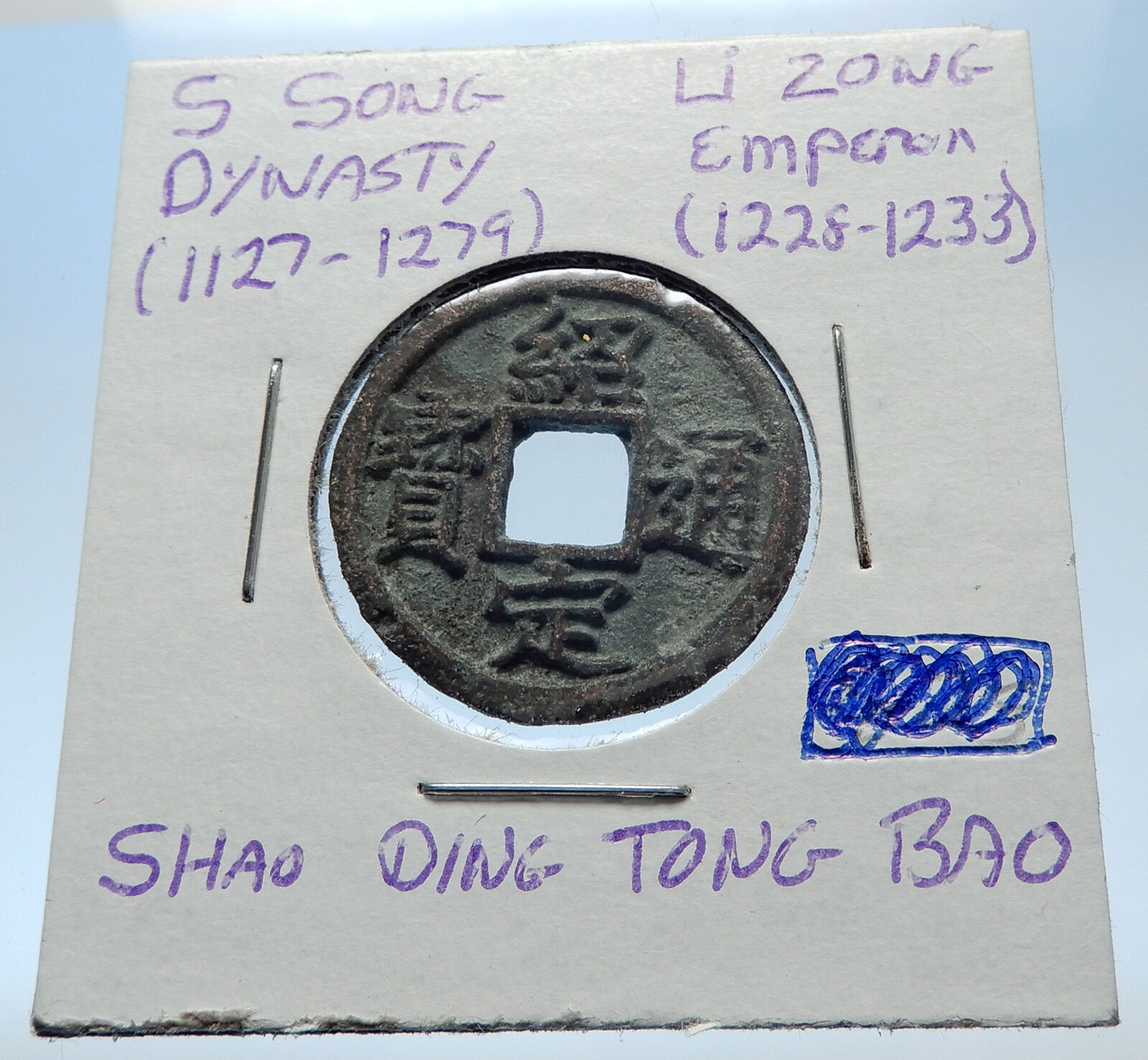|
China – Northern Song Dynasty (960-1127 A.D.)
Zhe Zong – Emperor: 1086-1100 A.D.
Shao Sheng Yuan Bao c/wise
Bronze Cash 24mm (3.70 grams) Cast circa 1086-1100 A.D.
Reference: H 16.308
You are bidding on the exact item pictured, provided with a Certificate of Authenticity and Lifetime Guarantee of Authenticity.
Emperor Zhezong of Song (4 January 1077 – 23 February 1100), personal name Zhao Xu, was the seventh emperor of the Song dynasty of China. His original personal name was Zhao Yong but he changed it to “Zhao Xu” after his coronation. He reigned from 1085 until his death in 1100, and was succeeded by his younger half-brother, Emperor Huizong, because his son died prematurely.
 Emperor Zhezong was the sixth son of Emperor Shenzong. He ascended the throne at the age of nine under the supervision of his grandmother, Grand Empress Dowager Gao. Emperor Zhezong was the sixth son of Emperor Shenzong. He ascended the throne at the age of nine under the supervision of his grandmother, Grand Empress Dowager Gao.
As the young emperor’s regent, Grand Empress Dowager Gao appointed conservatives such as Sima Guang as Chancellor, who halted the New Policies set forth by Wang Anshi before dying in 1086. Emperor Zhezong was powerless and it was not until Grand Empress Dowager Gao’s death in 1093 that the emperor was able to reinstate Wang Anshi’s reforms and reduce the late Sima Guang’s influence.
Emperor Zhezong lowered taxes, stopped negotiations with the Tangut-led Western Xia state, and resumed armed conflict which eventually forced Western Xia to enter a more peaceful stance with the Song Empire. However, Emperor Zhezong was unable to stop fighting between conservative members of his government and the more liberal members who supported Wang Anshi’s reforms and in fact, the fighting intensified during Emperor Zhezong’s reign. ] This split would eventually contribute to the Northern Song dynasty’s demise in the 12th century.
On May 18, 1099, Zhezong became ill in which the symptoms were constant coughing and constipation. Zhezong did not get any better, even though he had taken many medications and so Zhezong asked his councilors to recommend physicians. Geng Yu, an physician who was recommended advised Zhezong and even though Zhezong followed his directions, there were no signs of him getting better.
On July, his constipation was replaced by severe diarrhea and Zhezong could not get up from his bed to receive medicine. Geng recommended spleen-warming pills, an action Zhezong’s mother supported.
The coolness of the weather improved Zhezong’s health; making him well enough to attend the celebration of his son Zhao Mao on August 8. But his illness returned so Zhezong cancelled his audiences for two days. When he saw his councillors on August 14, he told them that Geng gave him medicine to induce vomiting. He was slightly better but his appetite was gone and his belly constantly ached. Zhezong attended the banquet in honor of his son, in which he was in a very good mood and that his younger brother Zhao Ji also attended. However, Zhao Mao became sick. Zhezong, now in a bad mood due to his son’s illness told his councillors that the royal doctors were treating Zhao Mao. On September 26, Zhao Mao was getting better but soon died making Zhezong cancelling his audiences for three days. His birthday was a great celebration but was cut short when after the birthday party, he fell ill and was vomiting all day long. He also contracted laryngitis and could only speak with great effort. By December 21, Zhezong was close to death; he had a weak pulse.
Emperor Zhezong died on February 23, 1100 in Kaifeng at the age of 23 and was succeeded by his younger brother, Emperor Huizong.
Cash was a type of coin of China and East Asia, used from the 4th century BC until the 20th century AD. Originally cast during the Warring States period, these coins continued to be used for the entirety of Imperial China as well as under Mongol, and Manchu rule. The last Chinese cash coins were cast in the first year of the Republic of China. Generally most cash coins were made from copper or bronze alloys, with iron, lead, and zinc coins occasionally used less often throughout Chinese history. Rare silver and gold cash coins were also produced. During most of their production, cash coins were cast but, during the late Qing dynasty, machine-struck cash coins began to be made. As the cash coins produced over Chinese history were similar, thousand year old cash coins produced during the Northern Song dynasty continued to circulate as valid currency well into the early twentieth century.
In the modern era, these coins are considered to be Chinese “good luck coins”; they are hung on strings and round the necks of children, or over the beds of sick people. They hold a place in various superstitions, as well as Traditional Chinese medicine, and Feng shui. Currencies based on the Chinese cash coins include the Japanese mon, Korean mun, Ryukyuan mon, and Vietnamese văn.
The Northern Song Dynasty(4 February, 960 – 20 March, 1127) is an era during the Song Dynasty. It came to an end when its capital city, the city of Kaifeng, was conquered by enemies from the north. Later, the provisional capital of the Northern Song Dynasty was founded in Ying Tian Fu (present-day Shangqiu of Henan). Historically, the Song Dynasty include both the Northern and the Southern Song. It is named “Northern” to distinguish from the “Southern”, which resided mainly in Southern China. Emperor Taizu of Song elaborated a mutiny and usurped the throne of the Later Zhou (the last in a succession of five dynasties), which marked the beginning of the Dynasty. In 1127, its capital city Kaifeng fell into the hand of the state of Jin, during which time the emperor and his family all fell captive. The Northern Song came to its end the next year. It was ruled by nine emperors, and lasted for 127 years.
The ruled area of the Northern Song extended to the southeastern coast. Its Northern Border with the Liao state was the Hai River, Ba Zhou city, Hebei province, and Yanmen Pass, Shanxi (Jin) province, an essential pass of the Great wall. Its reign reached northwest to the Hengshan Mountain in Shaanxi (Shan/Qin), the east of Gansu province, and the Huangshui River of Qinghai, all the way to the border with the state of Liao. In the west, it shared the boundary line of Min Mountains and Dadu River (Sichuan) with Tibet and Dali Kingdom. It was also adjacent with Vietnam across Guangxi province. Still, the Northern Song Dynasty had been the smallest in terms of land area among all the united empires that were established on the vast Central Plains. As was recorded by Taiping Huanyu Ji, the population of the Northern Song Dynasty exploded from 32,500,000 in 980 C.E. to 100,001,200 in 1110 C.E..
The founding
Taizu, the first emperor of Song, Zhao Kuang Yin was a professional soldier. He was a Lifeguard in charge of the troops in front of the emperor’s palace in the Later Zhou. Zhao had become an essential military figure during the reign of emperor Shizong owing to his outstanding military exploits. After Shizong died, the young Gongdi emperor ascended the throne. Zhao later seized power through the Chenqiao Mutiny, and established the Song. He adopted an authoritarian centralized system to uproot the potential dictatorship and autocracy of senior officials, which had long been a threat ever since the mid-Tang Dynasty, and to solidify the authoritarian central government, a contributing factor to the stability and growth of the feudal social economy. On the other hand, the redundant bureaucracy and unnecessary official posts led to a terrible decline in efficiency and subsequently financial difficulties.
In the field of military, the Northern Song expanded troops, weakened the military power of generals by separating the power to different persons, and shortened their service term at one official post so that they would not have the chance to accumulate that much power before it threatened the central. The constant change of the general, however, resulted in the decline of fighting capacity of the soldiers, and the Northern Song troops had suffered repeated defeats against minority groups like the Liao and Western Xia. The frontier defense thus became empty and feeble, which was detrimental to national security. Overall, the authoritarian centralized system had to some extents contributed to the unification and stability of the feudal state, preventing the local separatism and peasant revolts from happening, but it also foreshadowed the deepening impoverished and enfeebled from the mid Northern Song.
During the spring festival in 960, Zhao’s partisan fellows made up false intelligence that the Liao state was to invade. The prime minister (in feudal China) then immediately commanded Zhao to go to the frontier to defend. On the third day of the first lunar month, Zhao arrived at Chenqiao, and was draped with the imperial yellow robe by his supporters (a ritual of admitting someone as the emperor, kind of like coronation) that night. The officials of the later Zhou deemed it as irreversible and did nothing but accepted the reality. The Gondi of later Zhou was forced to leave the throne, and Zhao subsequently became the Taizu of the Song dynasty.
In 961 and 969, during banquets, and while drunken (or pretended to be) Zhao threatened the generals for twice not to rebel against the Song just like he himself had done against the later Zhou, and deprived them of the power they used to have by assigning them to merely nominal positions while appointing civil officials as commanders in troops, to centralize the military power. The Northern Song dynasty was thus free from local military separatists, but at the same time the local resources were limited. It all led to its defeats in battles against the northern tribes.。
|





 Emperor Zhezong was the sixth son of Emperor Shenzong. He ascended the throne at the age of nine under the supervision of his grandmother, Grand Empress Dowager Gao.
Emperor Zhezong was the sixth son of Emperor Shenzong. He ascended the throne at the age of nine under the supervision of his grandmother, Grand Empress Dowager Gao.




